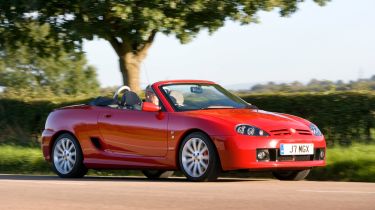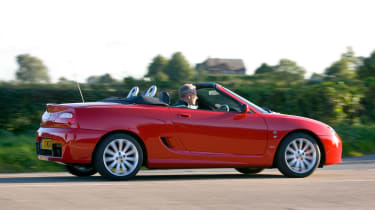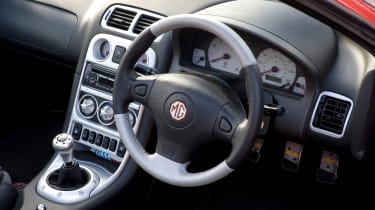Used MGF and MG TF (1995-2011) review: a cheap way to get open top thrills
A full used buyer’s guide on the MGF that was on sale between 1995 and 2002 and the MG TF that was on sale between 2002 and 2011
Verdict
If you’re looking for some cheap and stylish open-topped fun this summer, few cars fit the bill as well as an MG F or TF. They are among the most affordable ways of getting into a convertible, and even better, there’s no shortage of low-mileage examples about, plus there’s a thriving club scene and a host of specialists. These MGs have a reputation for poor reliability, but most of that comes from the engine’s readiness to blow gaskets. This is a weak spot that can now be overcome, though, with many engines having already been overhauled for greater durability. Crucially, the F and TF handle well, have a free-revving engine and both offer tremendous fun for the money. If you’re craving cheap thrills this summer, then look no further than the MG.
MG has been celebrating its centenary this year, and to mark the milestone, it unveiled a dramatically designed electric roadster. MG is a brand with a rich history of producing sports cars for the masses, but the Cyberster won’t be as accessible as its forebears, and many buyers in this segment won’t be ready to go electric just yet.
One solution is to buy one of MG’s previous petrol-engined sports cars, the F or the TF. These perfectly encapsulate what MG used to stand for: fun for those on a budget. Launched to enormous critical acclaim almost three decades ago, the F evolved into the TF, which enjoyed two separate production runs. Now you can buy an MGF for as little as £1,000, but are these cars the liability that some make them out to be?
History
The MGF arrived in August 1995, with a 121bhp 1.8-litre K-series petrol engine; a 147bhp VVC edition arrived in March 1996, with variable valve timing. A 114bhp 1.6-litre MGF joined the range in March 2001, then in January 2002 the F was replaced by the TF, which came in 1.6-litre (115), 1.8-litre (135) and 1.8 VVC (160) guises.
Used - available now

2022 Fiat
500
22,532 milesManualPetrol1.0L
Cash £9,549
2023 Honda
Jazz
24,192 milesAutomaticPetrol1.5L
Cash £14,999
2022 Vauxhall
Corsa
30,379 milesManualPetrol1.2L
Cash £11,549
2022 MINI
5-Door Hatch
32,498 milesAutomaticPetrol1.5L
Cash £15,049A continuously variable automatic transmission (CVT) was also available with the 1.8-litre engine, badged Stepspeed. As with the F, there were special editions, such as the Sprint (July 2002), Cool Blue (February 2003), Sunstorm (October 2003), 80th Anniversary (January 2004) and Spark (July 2004). The TF reappeared in September 2007 in LE500 form; by summer 2009 there were TF135 and 85th Anniversary editions, but by spring 2011 the TF was dead again.
Which one should I buy?
The 1.6-litre engine is short on zip, while the VVC engine provides enough power, but it costs more to run than the non-VVC unit, and it isn’t quite as reliable. The later LE500 edition wasn’t offered in VVC form. The regular 1.8-litre engine is the one to go for, with a manual gearbox; the Stepspeed automatic is rare and unloved, plus parts are scarce if it goes wrong.
While the TF has conventional steel suspension, the F came with Hydragas. The TF feels noticeably more taut as a result, but the F has a more comfortable ride. Quite a few Fs have been converted to steel springs by now, though, for greater reliability. Hard tops are worthwhile for year-round use; don’t bother with one if you’ll only use your MG in the summer.
Alternatives to the MGF and MG TF
The TF has fewer rivals than you might think, with the only truly affordable mid-engined two-seater being the third-generation Toyota MR2. These are plentiful and prices are low, but the Toyota can’t get even close to the level of usability that the MG offers, because it doesn’t have a proper boot. The Lotus Elise was a rival back in the day, but those have become very sought after now, so values are high.
The front-engined Mazda MX-5 is another plentiful alternative that’s cheap to buy, superb to drive and has a proper boot, but rust can be a real problem. The Audi TT, Mercedes SLK and BMW Z3 all offer two-seat open-topped motoring for little cash and came with a wider model range. But they cost more than the MG.
What to look for
Tyres
The tracking is easily knocked out of alignment, so check the tread wear of each front tyre.
Roof
The soft-tops are durable, but a replacement costs about £1,000 (including fitting). Used hard-tops are readily available for £300-£500.
Coolant
A caring owner will have fitted a water-level sensor kit to warn of a low coolant level; you can buy one for £200 and easily fit it yourself.
Trim
If the interior has seen better days, you can find everything to spruce things up. Retrimmed seats and carpet sets are available from Newton Commercial.
Common faults
Head gaskets and Hydragas suspension are the main weaknesses, but fixing a gasket needn’t be too costly, and it’s cheaper to overhaul the F’s Hydragas set-up than the TF’s conventional springs.
Interior
There’s not a lot of difference between the F and TF cabins, although the latter is a bit more plush and looks slightly more modern. However, this is a car that was developed 30 years ago, so it’s dated but still ergonomically sound, with a user-friendly design, comfortable seats and okay build quality. Many broken parts can be replaced with higher-quality items from Mike Satur (mikesatur.co.uk).
Practicality is good, with plenty of cabin room, while the 210-litre boot capacity is excellent for a mid-engined two-seater; there’s enough carrying capacity for a week’s holiday luggage.
Prices
There are plenty of good cars available, with lots of low-mileage examples now coming out of the woodwork; these often fetch a disproportionate premium.
To check prices on a specific model head over to our free car valuation tool.
Running costs
The official schedule for the F and TF sets maintenance every 12 months or 15,000 miles, with a sequence that runs: minor, intermediate, minor, major. But few of these cars cover a big annual mileage now, so most specialists tend to alternate between minor and major.
An independent MG specialist such as Rough Luck (roughluckracing.com/servicing) charges £155 for a minor service and £280 for a major (£315 for VVC models). A fresh cambelt is required on all Fs and TFs every four years or 60,000 miles; Rough Luck charges £235 to do this, or £270 for a VVC engine, but most specialists charge more. The brake fluid (£60) should be renewed every two years, and the coolant every four years (£60).
Recalls
The MGF was recalled just once. That campaign was in December 2001 and centred on Fs built between September 2000 and September 2001 that could suffer from an electrical short circuit, leading to problems with the seatbelt pretensioners.
There was one recall for the original TF, too. This came in February 2003, because cars built between February and December 2002 could suffer from fractured shock-absorber mounting bolts.
MG Motor then recalled the reintroduced TF twice. The first time was in October 2009 and affected cars built between October 2008 and September 2009; there were potential suspension and steering problems. Models built between January 2008 and December 2010 were the subject of a recall in March 2011, due to the possibility of suspension failures.
Driver Power owner satisfaction
The F and TF haven’t appeared in a Driver Power survey and if you listen to social-media comments, especially from people who have never owned an MG, you’d be scared off. The MG’s reputation is poor. But speak to owners for a more accurate picture and you’ll see that for the price of a big service on a new car, you could buy a reliable, practical mid-engined sports car that will give years of service.
Looking to sell your current car quickly and for a good price? Try our Free Car Valuation tool today!










